Expedite your nonfiction book discovery process with Readara interviews, summaries and recommendations, Broaden your knowledge and gain insights from leading experts and scholars
In-depth, hour-long interviews with notable nonfiction authors, Gain new perspectives and ideas from the writer’s expertise and research, Valuable resource for readers and researchers
Optimize your book discovery process, Four-to eight-page summaries prepared by subject matter experts, Quickly review the book’s central messages and range of content
Books are handpicked covering a wide range of important categories and topics, Selected authors are subject experts, field professionals, or distinguished academics
Our editorial team includes books offering insights, unique views and researched-narratives in categories, Trade shows and book fairs, Book signings and in person author talks,Webinars and online events
Connect with editors and designers,Discover PR & marketing services providers, Source printers and related service providers

Sick to Debt: How Smarter Markets Lead to Better Care
Medical > Health Policy
- Yale University Press
- Hardcover
- 9780300238464
- 9.3 X 6.3 X 0.9 inches
- 0.85 pounds
- Medical > Health Policy
- (Single Author) Asian American
- English
Readara.com
Book Description
The United States has the most expensive healthcare system in the world. While policy makers have argued over who is at fault for this, the system has been quietly moving toward high-deductible insurance plans that require patients to pay large amounts out of pocket before insurance kicks in. The idea behind this shift is that patients will become better consumers of healthcare when forced to pay for their medical expenses.
Laying bare the perils of the current situation, Peter A. Ubel--a physician and behavioral scientist--notes that even when patients have time to shop around, healthcare costs remain largely opaque, difficult to access, and hard to compare. Arguing for a middle path between a market-based and a completely free system, Ubel envisions more transparent, smarter healthcare plans that tie the prices of treatments to the value they provide so that people can afford to receive the care they deserve.
Author Bio
Peter Ubel M.D. is a physician and behavioral scientist whose research and writing explores the mixture of rational and irrational forces that affect our health, our happiness and the way our society functions. (What fun would it be to tackle just the easy problems?)
Ubel is the Madge and Dennis T. McLawhorn University Professor of Business, Public Policy and Medicine at Duke University. His research explores controversial issues about the role of values and preferences in health care decision making, from decisions at the bedside to policy decisions. He uses the tools of decision psychology and behavioral economics to explore topics like informed consent, shared decision making and health care cost containment. His books include Pricing Life: Why it’s time for healthcare rationing (MIT Press 2000) and Free Market Madness: How economics is at odds with human nature—and why it matters (Harvard Business Press, 2009). His newest book, Critical Decisions (HarperCollins, 2012) explores the challenges of shared decision making between doctors and patients. You can find his blogs and other information at http://www.peterubel.com/.
I am a physician and behavioral scientist at Duke University. My research and writing explores the quirks in human nature that influence our lives — the mixture of rational and irrational forces that affect our health, our happiness and the way our society functions. (What fun would it be to tackle just the easy problems?)
I am currently exploring controversial issues about the role of values and preferences in health care decision making, from decisions at the bedside to policy decisions. I use the tools of decision psychology and behavioral economics to explore topics like informed consent, shared decision making and health care spending. My books include Pricing Life (MIT Press 2000) and Free Market Madness (Harvard Business Press, 2009). My newest book, Critical Decisions (HarperCollins), is coming out in September of 2012, and explores the challenges of shared decision making between doctors and patients.
Source: Duke University's Fuqua School of Business
Videos








Community reviews
No Community reviews

